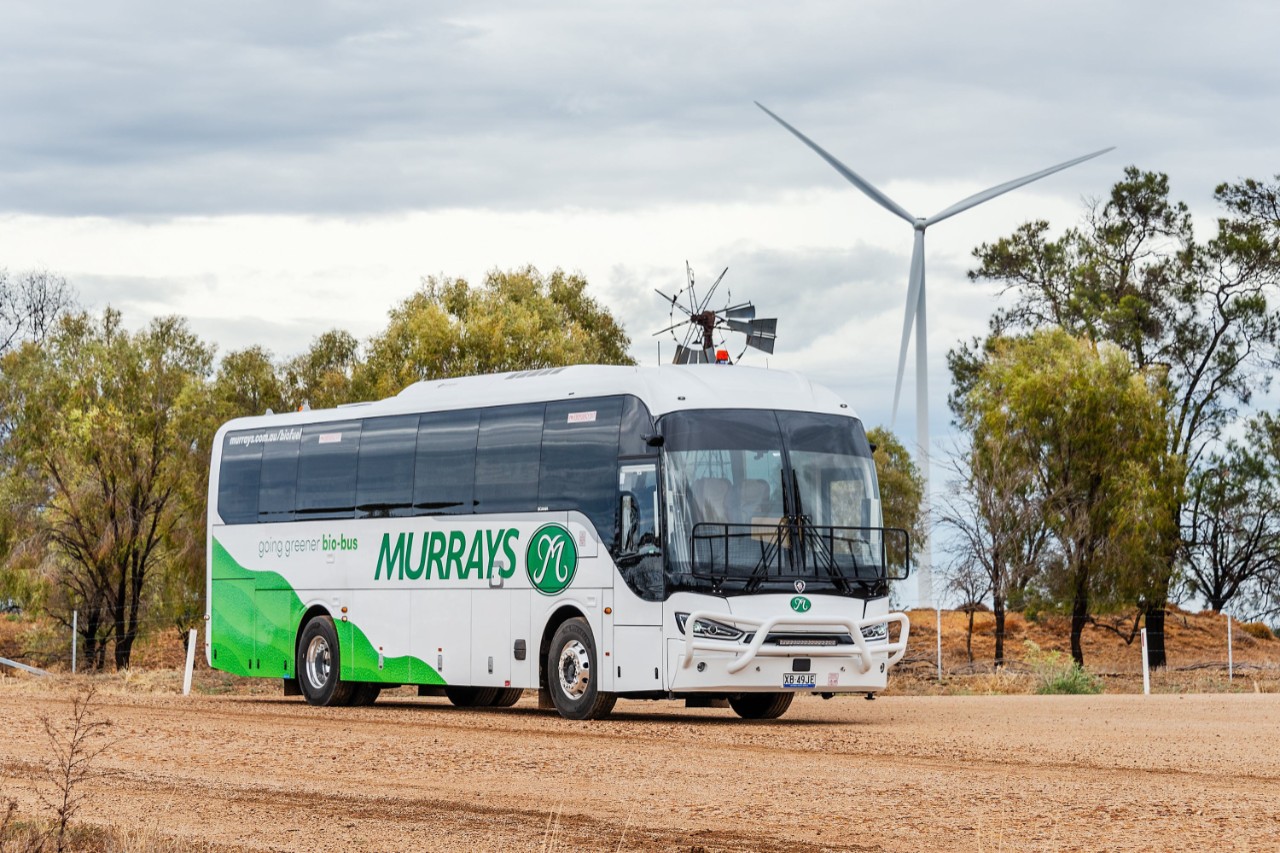
Scania delivers five biodiesel fuelled coaches to Murrays
Murrays Coaches’ bid to drive down its emissions profile continues with the arrival of five new biodiesel-fuelled vehicles for use in Queensland.
Murrays Coaches, operating transit contracts between Brisbane and regional Queensland, will vastly reduce its CO2 emissions (by more than 80%) thanks to the arrival of five new Scania coaches, running as standard on B100 Biodiesel.
The locally produced biodiesel further serves to reduce reliance on imported fuels and has fast-tracked Murrays Coaches’ drive for cleaner emissions.
The order for the five new coaches, fitted with BCI bodies, was prompted by one of Murrays’ customers requesting a low emissions solution for the transport of workers from Brisbane to the Queensland interior. The vehicles all feature Scania’s state-of-the-art Advanced Driver Assistance Safety systems.
In 2022, Scania was able to provide a simple switchover to biodiesel compatibility for B100 for two of the Scania-based coaches already in service with the operator.
“Increasingly our customers are asking us how they can reduce their carbon footprints,” says Scania Australia Bus and Power Solutions Director of Sales, Julian Gurney. “All through the business chain, there is a growing interest in reducing emissions.
“The good news is that we have solutions to these requests here and now and ready for implementation. In fact, all our bus engines can run on a blend of diesel and biodiesel from B10 all the way to B100, as in the case with Murrays Coaches, direct from the factory,” he says.
“To support our customers switching to biodiesel, Scania has established partnerships with fuel producers who can supply biodiesel to the EN 14214 standard, and fuel transport operators to ensure supplies are readily available. Using B100 biodiesel gives our customers the unmatched Scania reliability they need day-to-day, with significantly lowered climate impact.” he says.
Murrays will be supplied by Scania’s partner ECOTECH Biodiesel, with deliveries made via Refuelling Solutions.
Murrays says initial trials in 2022 showed that running their coaches on B100 delivered very similar power and fuel efficiency, but provided the not insignificant benefit of an 80% or more reduction of CO2 emissions.
The new BCI bodied Scania-powered coaches entering service with Murrays now will be used to ferry workers to and from The Surat Basin.
“We have had the flexibility with Scania and BCI to select the components we know work well in our operating environment to build buses that we are confident will stand up to Australia’s harsh operating conditions,” says Justin Cannon, Murrays Coaches’ National Fleet Manager.
“Corporately we are keen to reduce our CO2 emissions,” Justin says.
“Up to now we have operated six Scania-powered vehicles in our fleet in Queensland and the new coaches will augment this fleet.
“The new coaches will be running from Brisbane to Toowoomba as well as on to Chinchilla and The Surat Basin. We expect that they will cover about 20,000 km per month, operating in regional areas with at times harsh conditions. I am confident the Scania product will be more than capable meet the challenge,” Justin says.
“We’re delighted that Murrays has partnered with Refuelling Solutions” says Refuelling
Solutions Future Fuels Manager Simon Roycroft. “We’re already working on future investment plans to extend emission reductions” he says.
“It is very exciting to be working with leading organisations that are at the forefront of this once in a lifetime energy transition, delivering customer focused renewable low carbon liquid fuel solutions.”
“Murrays began its long-standing relationship with BCI in 2010, based on the Western Australian body builder’s adaptability, quality processes and manufacturing volume capacity,” says BCI Australia Sales Development Manager, Armando Baylon.
“The Scania BCI fleet for Chinchilla incorporates composite panels and a stainless-steel frame for a long vehicle lifecycle, plus some of the most innovative features in a long-distance coach, with a special focus on passenger and driver safety and comfort. These include internal lighting for fatigue reduction, seatbelt sensor check system, driver’s electric window, and mirrorless monitoring camera set, as per Murrays high standards for this application,” he says.
Scania’s ADAS equipment is designed to reduce the potential for collisions or injuries, by alerting the driver to the presence of vulnerable road users and pedestrians while driving.
The Murrays coaches are fitted with Scania’s Vulnerable Road User Warning, Blindspot Warning, Active Emergency Braking, Adaptive Cruise Control, and Lane Departure Warning.
“These ADAS systems mean our new buses and coaches will be smarter, safer and will provide a greater level of protection for everyone,” Julian Gurney says.
“The benefits to operators are clear: These systems help prevent accidents, reduce repair costs, reduce time off road and have the potential to reduce insurance premiums. A key benefit from our perspective is also that they assist in the maintenance of good driver mental and physical health, which leads to higher levels of staff retention,” he says.
“A further bonus is that drivers find our buses and coaches are very relaxing to drive, reducing fatigue and enhancing alertness behind the wheel.”